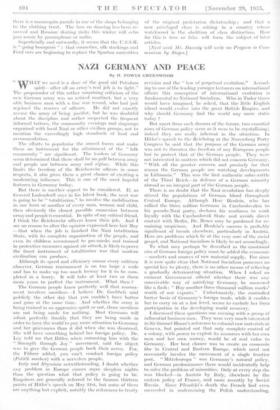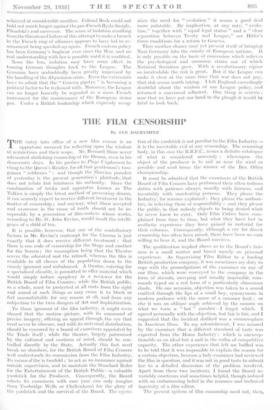NAZI GERMANY AND PEACE
fly H. POWYS GREENWOOD
"HAT we need is a dose of the good old Potsdam W spirit—after all an army's real job is to fight." The propounder of this rather surprising criticism of the new German army was no retired martinet, but a very able business man with a fine war record, who had just rejoined the reserve of officers. He did not exactly accuse the army of being pacifist, but he was doubtful about the discipline and rather suspected the frequent informal tattoos, the community evenings and singsongs organised with local Nazi or other civilian groups, not to mention the exceedingly high standards of food and accommodation.
The efforts to popularise the armed forces and make them an instrument for the attainment of the " folk community " are significant. The leaders of Germany seem determined that there shall be no gulf between army and people nor between army and regime. While this limits the freedom of the Reichswchr officers in some respects, it also gives them a great chance of exerting a moderating influence. This is, one of the most hopeful features in Germany today. But there is another aspect to be considered. If, as General Ludendorff says in his latest book, the next war is going to be " totalitarian," to involve the mobilisation in one form or another of every man, woman and child, then obviously the closest possible connexion between army and people is essential. In spite of my critical friend,. I think the Reiehswehr officers know their job. And I see no reason to alter the opinion expressed here last May —that when the job- is finished the Nazi totalitarian State, with its complete organisation of the people, and even its children accustomed to gas-masks and trained in protective measures against air attack, is likely to prove the finest. instrument of totalitarian war that modern eiviliSation 'can produce. Although its speed and efficiency amaze every military observer, German rearmament is on too large a. scale and has to make up too much leeway for it to be com- pleted in a hurry. It will take at least two or three more years to perfect the instrument. What then ? The German people know perfectly well that rearma- meat involves sacrifices—I believe Dr. Goebbels said publicly the other day that you couldn't have butter and guns at the same time. And whether the army is being trained in an aggressive spirit or not, those sacrifices are not . being made for nothing. Most Germans will admit perfectly frankly that they are being made in order to force the world to pay more attention to Germany and her grievances than it did when she was disarmed.. She will have something behind her foreign policy. Dr. Ley told me that Hitler, when entrusting him with the " Strength through Joy " movement, said the object was to give the German people back their nerve. For, the Fiihrer added, you can't conduct foreign policy (Politik machen) with a nerveless people.
Italy and Abyssinia notwithstanding, I doubt whether any problem in Europe causes more sleepless nights than the question what that policy is going to be. Enquirers are generally referred to the famous thirteen points of Hitler's speech on May 21st, but some of them are anything but explicit, notably the references to treaty revision and the " law of perpetual evolution." Accord- ing to one of the leading younger lecturers on international affairs this conception of international evolution is fundamental to National Socialism. Who in Tudor times would have imagined, he asked, that the little English . island would evolve into the great British Empire, and why should Germany find the world any more static today ?
But apart from such dreams of the future, two essential aims of German policy seem as it were to be crystallising; indeed they are really inherent in the situation. In Hitler's speech to the .Reichstag at the Nuremberg Party Congress he said that the purpose of the German army was not to threaten the freedom of any European people but to protect that of the German people. They were not interested in matters which did not concern Germany.
" With all the greater concern and precisely for that reason the German people are watching developments in Lithuania." This was the first authentic sabre-rattle of the Third Reich—in defence of a German minority abroad as an integral part of the German people.
There is no doubt that the Nazi revolution has deeply stirred the populations of German blood throughout Central Europe. Although Herr Hcnlein, who has rallied the three million Germans in Czechoslovakia to his pseudo-Nazi party, declares his readiness to work loyally with the Czechoslovak State and avoids direct contact with Berlin, Dr. Bones may be pardoned for re- maining suspicious. And Henlein's success is probably significant of trends elsewhere, particularly in Austria.
Here are problems which lie at the very core of the racial gospel, and National Socialism is likely to act accordingly. To what may perhaps be described as the emotional aim of German foreign policy must be added the economic —markets and sources of raw material supply. For since it is now quite clear that National Socialism possesses no special key to plenty, there is no other means of relieving a gradually deteriorating situation. When I asked an eminent Government official whether there was any conceivable way of satisfying Germany, he answered like a flash : " Buy another three thousand million marks' worth of our exports." Unfortunately, the controlled barter basis of Germany's foreign trade, while it enables her to carry on at a low level, seems to exclude her from participation in the developing world recovery.
I discussed these questions 'one evening with a group of influential business men. They were very much interested in Sir Samuel Hoare's reference to colonial raw materials at Geneva, but pointed out that only complete control of a colony, with power to exploit its resources with her own men and her own money, would be of real value to Germany. Her best chance was to create an economic bloc in Central and Eastern Europe, which need not necessarily involve the movement of a single frontier post. " Mitteleuropa " was Germany's natural policy, and German predominance there would incidentally help to solve the problem of minorities. Only at every step she was blocked—in Austria by Italy, elsewhere by the eastern policy of France, and more recently by Soviet Russia. Since Pilsudski's death the French had even succeeded in undermining the Polish understanding, achieved at considerable sacrifice. Colonel Beck could not bold out much longer against the pro-French Rydz-Smigly, Pilsudski's real successor. The sense of isolation resulting from the threatened failure of this attempt to make a breach in the French ring of alliances appears to have led to re- armament being speeded-up again. French eastern policy has been Germany's bugbear ever since the War, and no real understanding with her is possible until it is modified.
None the less, isolation may have some effect in turning .German thoughts back to the League. The Germans have undoubtedly been greatly impressed by the handling of the Abyssinian crisis. Even the extremists have to admit that the " Geneva pigstye " is becoming a political factor to be reckoned with. Moreover, the League can no longer honestly be regarded as a mere French instrument for the maintenance of the European status quo. Under a British leadership which expressly recog- nises the need for " evolution " it seems a good deal more palatable. By implication, at any rate, " evolu- tion," together with " equal legal status " and a " clear separation between Treaty and League," are Hitler's three conditions for a return to Geneva.
Thus another chance may yet present itself of bringing Nazi Germany into the comity of European nations. it is only possible on the basis of concession which relieves the psychological and economic strain out of which National Socialism grew. With a revolutionary regime so incalculable the risk is great. But if the League can make it clear at the same time that war does not pay, that risk seems worth taking. I left England exceedingly doubtful about the wisdom of our League policy, and returned a convinced adherent. One thing is certain : now that we have put our hand to the plough it would be fatal to look back.













































 Previous page
Previous page